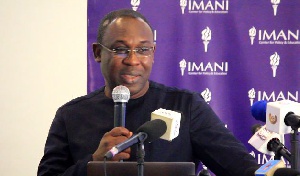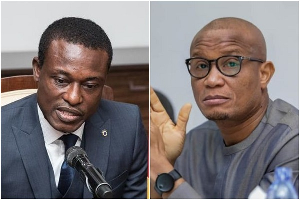The Vice President of think tank Imani Africa, Mr Kofi Bentil, has said even though he is “favour of engineering our resource revenues for greater returns as a nation”, after analysing the Agyapa deal, he believes it is “terrible and corrupt” agreement.
Parliament, a few weeks ago, in line with the Minerals Income Investment Fund (MIIF) Act, 2018 (Act 978), approved agreements to allow the country to derive maximum value from its mineral resources and monetise the mineral income accruing to Ghana in a sustainable and responsible manner.
The move gives Agyapa Royalties Limited the right to secure about $1 billion to enable the government to finance large infrastructural projects.
The Minority in Parliament boycotted the deal and accused the government of mortgaging Ghana’s gold resources.
Former President John Mahama, flagbearer of the biggest opposition party, the National Democratic Congress (NDC), also reiterated the Minority’s concerns and said he will not respect the deal should he win the 7 December 2020 polls.
A coalition of CSOs in the mining industry has also kicked against it.
However, Finance Minister Ken Ofori-Atta has said given the deal a clean bill of health.
Addressing a press conference in Accra on Thursday, 27 August 2020, Mr Ofori-Atta said: “… Agyapa is 100 percent owned by MIIF, which is 100 percent owned by the government and there are no hidden beneficiaries in that regard”.
“It is a clean transaction as far as I know and we’re just looking for ways to maximise value and to play in the game that our multinationals play and now we have the skillset to be able to do that”, he asserted.
“So, once begin the process of listing, all of us – and it’s going to be listed both in London and in Ghana and we’ve done that before with AngloGold Ashanti etc., so it’s not a mystery, in a sense, to do that”, Mr Ofori-Atta added.
He said the transaction, “as far as I know, has been as transparent as you can see it; it’s gone through Parliament on many levels, gone through Cabinet on many levels and there’s truly nothing to hide except creating something new that may be uncomfortable but it is something new that is going to stand us in great order”.
In the long run, Mr Ofori-Atta said he foresees Agyapa becoming a major player in Africa.
“I remember being on Wall Street and companies like Barrick starting and within an issue of a decade, becoming the third-largest company in the world. It is in the same ambition here and that this Agyapa is going to be the largest company in Africa, in the minerals resource place if we manage it right with the type of people that we are making sure are going to be custodians for this”, he noted.
He also denied that Ghana’s gold is being mortgages.
“There are those who say we should be careful not to mortgage or sell today, the gold in the ground for future generations. First of all, this is not the case.
“But I have two questions for those who raise these concerns: if it is OK for the foreign investor who holds the concession to sell what is in the ground upfront, then why not us? But more importantly, why is it OK to borrow today for the future and not good to use our resources to leverages assets for tomorrow.
“We must be creative to expand our sources of raising income to support our development. We are in a hurry to catch up. Every year, every generation we wait, we keep people and families stuck in the abyss of poverty and suffering.
“If we want to increase our share of the global pie, it, sometimes, means creating innovative structures that give direct access to the natural resource in a manner that is open and transparent and operate in accordance with laws that exist outside our own country.
“That is why listed oil companies that operate in Africa can raise capital at levels closer to the European companies where they are based and not the countries where they operate. They create structures that focus the investors’ exposures on the commodity, not the country which opens up new areas of funding.
“The tactic of compartmentalising and separating perceived risks with actual risks has helped fuel companies to create more value from our resources than the governments and people who own the resources themselves”, Mr Ofori-Atta said.
Business News of Monday, 31 August 2020
Source: classfmonline.com













